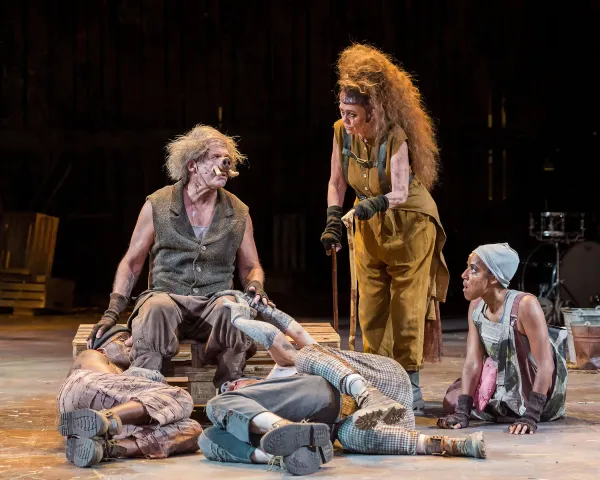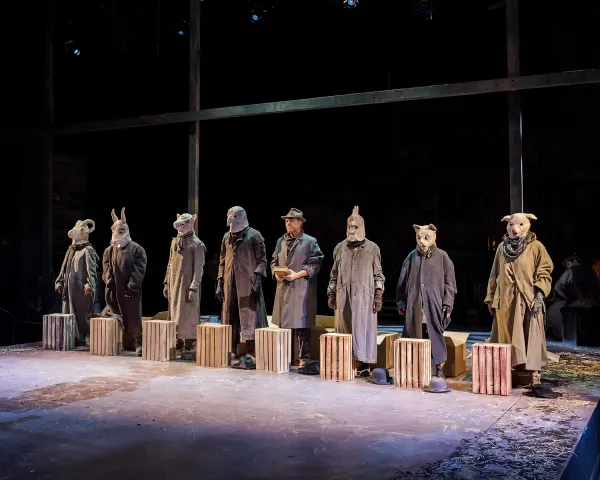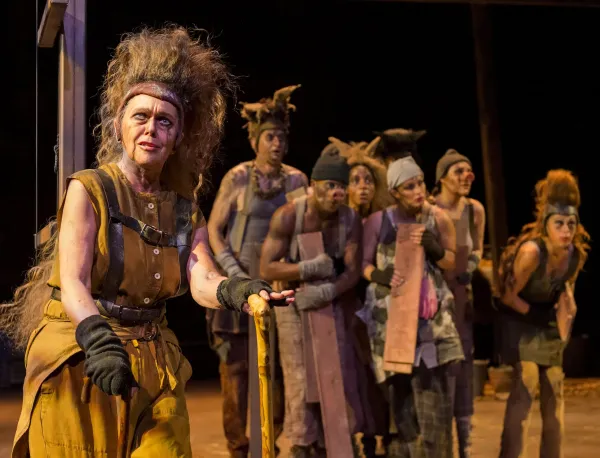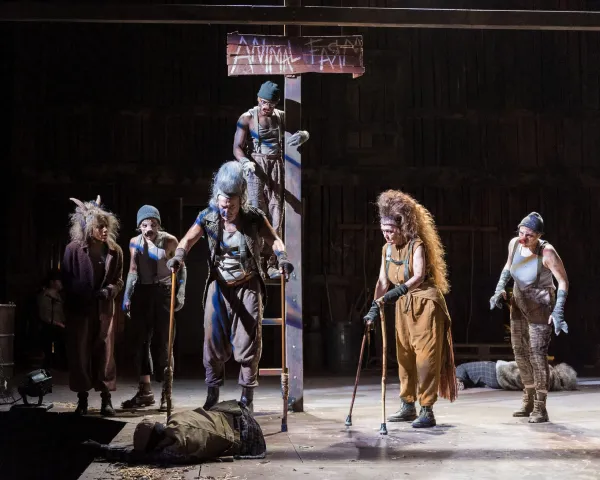Orwell’s Peerless Proletarian Parable: Socialism with an Animal Face
Not even Brecht or Odets could make this one up: Mere days before A Noise Within debuts a theatrical version of George Orwell’s classic satirizing the betrayal of the Russian Revolution, as if right on cue, the last leader of the Soviet Union dies. Mikhail Gorbachev, of course, embodied the central theme of Animal Farm: Could socialism be democratic in nature or must it be bureaucratic and autocratic? I always regarded Lucy Pollak as a great publicist, but even she couldn’t pull off a publicity stunt like staging Gorbachev’s death right before the premiere of this proletarian parable about the USSR. Not to mention the timeliness of the ongoing conflict between Moscow and Kyiv…
ANW’s superb production presents Sir Peter Hall’s Animal Farm, with live music by Richard Peaslee and lyrics by Adrian Mitchell, is a perfect choice to open over Labor Day weekend. The musical premiered at the UK’s National Theatre in that most Orwellian of years – 1984, but of course – and adapts the 1945 novella by George Orwell.
On the surface, Orwell’s satire can simply be seen as a forerunner of the animal rights movement. The horses, lambs, chickens, cattle, pigs, etc., at Manor Farm are mercilessly oppressed and exploited by Farmer Jones (Bert Emmett, who also plays one of the sheep). Roused by the idealistic boar Old Major (ANW’s esteemed producing artistic director Geoff Elliott, who also has a double role) and spontaneously triggered by an act of cruelty by Jones, the wretched of the farm finally rise up, seize the land and chase the tyrannical human off the property, transforming it into “Animal Farm,” a society where the egalitarian philosophy of “Animalism” declares seven guiding principles, most importantly the commandment that “All animals are equal.”
Inspired by the notion that “four legs good, two legs bad,” the beasts-of-burden-no-more set out to overthrow the human race and create a perfect society. (Human beings are so convinced of their superiority and centrality in the scheme of things that it never occurs to humans that pandemics, wildfires and other cataclysmic climate disasters may be Mother Nature’s attempts to rid and purge the planet of the species causing the climate crisis, and thus to save the world. I’m just saying…)
But soon after the Rebellion jockeying for power ensues, as a new porcine ruling class emerges. After a fierce power struggle between the true-blue Snowball (the excellent Stanley Andrew Jackson) and the scheming, self-serving Napoleon (Rafael Goldstein, who has perfected a squeal for the ages), who – aided by his leatherjacket-clad dogs (played by Cassandra Marie Murphy and Nicole Javier, who both have multiple roles) – ruthlessly routes the beleaguered Snowball, first forcing him into exile, then eventually having him assassinated. Animal Farm’s democracy is subverted, usurped by the ambitious, brutal, dictatorial Napoleon. Soon it’s a case of, to paraphrase The Who: “Meet the new pigs, same as the old pigs.” (See/hear: https://www.youtube.com/watch?v=zYMD_W_r3Fg.) Napoleon and his cohorts betray the animals’ revolution and pervert their visionary Animalist slogan into: “All animals are equal but some animals are more equal than others.” Napoleon and the new swinish ruling class are indistinguishable from humans, while the mass of animals remain immiserated.
Decoding Animal Farm: A Who’s Who of the Revolutions Betrayed Portrayed
The greatest literary gift of Orwell – who graduated from Eton, that British bastion of ivy-covered academia – was his ability to simplify complex subjects, rendering them understandable and accessible to ordinary readers. Thus, the brilliance of Animal Farm, which Orwell subtitled A Fairy Story, is that while it’s written like a fable, it is rather famously, an allegory of the Russian Revolution. Who do this proletarian parable’s characters represent in real life?
Mr. Jones signifies Imperial Russia’s Czar Nicholas. Old Major is a composite character, based on Karl Marx, founder of communism, and Bolshevik Vladimir Lenin, who led the October Revolution in 1917. Like Lenin’s embalmed cadaver at a Red Square mausoleum, Old Major’s skull is preserved and displayed as a totem nailed to Animal Farm’s flagpole. (Unfortunately, during the musical’s two acts the flag is never unfurled, so the audience never got to see it on opening night.)
The Animals’ rousing hymn, “Beasts of England,” is their equivalent to lyricist Eugène Pottier’s revolutionary anthem “The Internationale.” Orwell’s conniving, manipulative pig Napoleon clearly symbolizes Joseph Stalin, the General-Secretary of the Central Committee of the Communist Party who emerged as the Soviet Union’s despotic leader by the late 1920s. As the swine evolves (so to speak) over the course of the two-hour drama, with the able assistance of costume designer Angela Balogh Calin and wig and make-up designer Tony Valdes, Goldstein more and more resembles the mustachioed Stalin.
(In what’s called “Lenin’s Testament,” the ailing Bolshevik chief wrote in 1922: “Stalin is too rude and this defect… becomes intolerable in a Secretary-General. That is why I suggest the comrades think about a way of removing Staling from that post and appointing another man…” “Lenin’s Testament” was suppressed until Nikita Khrushchev’s “secret speech” at the 1956 20th Party Congress.)
Snowball represents Leon Trotsky, the Bolshevik who led the Red Army and preached a theory of worldwide workers’ revolts called “Permanent Revolution.” In the play, Snowball triumphantly leads “the Battle of the Cowshed” and dispatches pigeons far and wide to spread Animal Farm’s “Animalist” message to other creatures, to spread the Rebellion. Like Trotsky who lost a faction fight with Stalin, Snowball is banished by the scheming Napoleon and Squealer and eventually liquidated. The power struggle between the sincere Snowball and plotting, “practical” pig Napoleon perfectly captures the faction fight between Trotsky and Stalin, and is quite heartbreaking to behold.
Jackson excels as Snowball, and although he is also good in his double role as Mr. Whymper, the capitalist who does business with Napoleon, I think it was, from an ideological perspective (although I understand that there are other reasons why casting decisions are made), a mistake to also cast the actor who portrays Trotsky, the apostle of Permanent Revolution, as the businessman Whymper, who may be based on Armand Hammer, the so-called “Lenin’s favorite capitalist.” (It would have been delicious to have actor Armie Hammer depict a character who may have been inspired by his own great-grandfather.)
The hard-working, steadfast, loyal carthorse Boxer (powerfully played by Geoff Elliott) is inspired by miner Aleksei Grigorievich Stakhanov, widely emulated as a model worker in the USSR for his prodigious productivity during the second five-year plan. The sincere but uneducated, misled horse’s answer to everything is to “work harder” and believe that Napoleon is always right.
Squealer (Trisha Miller), the pigs’ propagandist, is a glib porker exercising persuasive power over the other animals reminded me of Politburo member Grigory Zinoviev as portrayed by Jerzy Kosinski in Warren Beatty’s 1981 epic Reds, as an icy, ironfisted agitprop officer rewriting American journalist John Reed’s (Beatty) speeches. Given the role that propaganda on social media and in other outlets plays nowadays, with the “big Lie,” “fake news,” and so on, Squealer’s role is very timely.
However, Zinoviev was ousted by Stalin in 1926 and executed a decade later during the Moscow show trials. While these courtroom confessions – often for alleged collaboration with the exiled Trotsky (i.e., Snowball) in the form of sabotage – are indeed depicted in Orwell’s gory allegory, Squealer is never purged or executed by Napoleon.
Some suggest Squealer is supposed to be Vyacheslav Mikhailovich Molotov, a Stalin protégé who survived the Great Terror and whom the “Molotov Cocktail” was named after. Along with his German counterpart, he co-signed the infamous Molotov-Ribbentrop Pact, a short-lived Soviet-Nazi agreement that reversed the Soviet Union’s anti-fascist stance until it, too, was attacked by Hitler. (Orwell memorably lampoons this reversal of fortunes and alliances in 1984.) Others believe Squealer is a stand-in for the propagandistic Soviet mass media, such as the newspaper Pravda (which ironically means “Truth”).
The donkey Benjamin seems to equate with Nikolai Bukharin (whose last name, like Benjamin, begins with a “B” and ends with an “n”) or Lev Kamenev, Bolshevik intellectuals who vacillated in the fights for power with Stalin. That Benjamin is portrayed by ANW’s Resident Artist Jeremy Rabb, who previously played Jim Bayliss in the company’s production of Arthur Miller’s All My Sons and Marley in ANW’s annual A Christmas Carol offering, et al, is a testament to Rabb’s versatility as an actor.
The vicious dogs (Murphy and Javier), of course, stand for Stalin’s secret police, the NKVD (later the KGB). Other notables include Deborah Strang as the well-meaning if easily fooled, uneducated carthorse Clover. In addition to playing one of the KGB-like dogs, Nicole Javier portrays the vain horse Mollie, who seems to symbolize bourgeois individualism.
ANW producing artistic director Julia Rodriguez-Elliott helms her sprawling cast tautly, with a Brechtian sensibility in terms of the mise-en-scène atop Calin’s thrust stage, which has a barnlike ambiance. Calin’s costumes, Valdes’ wigs and makeup, Dillon Nelson’s masks plus Ken Booth’s lighting bestows a Mad Max-like vibe upon the production, which serves Orwell’s dystopian themes extremely well. Live musicians playing piano, drums, woodwinds, trumpet and flugelhorn bring Richard Peaslee’s music vividly alive, sometime chillingly, other times stirringly.
Everywhere There’s Lots of Piggies Leading Piggie Lives…
[PLOT SPOILER ALERT!] ANW’s version of Orwell’s fable ends differently from his novella. On the boards, we see humans sitting with clothed pigs, and they are indistinguishable from one another. But in Orwell’s book, the still downtrodden animals look through a window into a house to behold the human beings and swine, and as Orwell writes in his grand finale, to the beasts observing the meeting, “they were all alike. No question, now, what had happened to the faces of the pigs. The creatures outside looked from pig to man, and from man to pig, and from pig to man again; but already it was impossible to say which was which.” (See: http://www.george-orwell.org/Animal_Farm/9.html .)
However, as staged in ANW’s play the rank-and-file animals are absent and they are not observing the scene, which is otherwise indeed as Orwell did describe it. Well, no work about Stalin would be complete without the rewriting history and story! But then again, maybe the sly point being made here is that the audience members watching the play unfold onstage are the equivalent of Orwell’s oppressed animals?
(Speaking of gatherings, the reception following the premiere offered the tastiest repasts of any of the ANW after-parties I’ve attended, and was catered by Evin’s Mini Pies. In addition to delicious quiche-like morsels, plenty of shrimp abounded on the tables in ANW’s lobby space, along with pigs in a blanket – well, at least theatergoers finally found out what happened to Snowball!).
As we reflect on the passing of Gorbachev and his “Glasnost” policies, we can see that he is in the lineage of Snowball, while Putin is in the line of that aptly-named oinker Napoleon. In any case, while all plays may be equal, ANW’s Animal Farm is “more equal” than other plays and is the best live stage production this revolutionary reviewer has seen all year. Fans of great theater, satire, political discourse, et al, should get on all four hoofs and gallop out to Pasadena to see this Orwellian tour de force tout suite. Animals of the world, unite!
Animal Farm is being mounted through October 2 on Fridays at 8:00 p.m.; Saturdays at 2:00 p.m. and 8:00 p.m.; and Sundays at 2:00 p.m. There will be one additional performance, on Thursday, Sept. 29 at 7:30 p.m. Post-performance conversations with the artists will take place on Fridays, Sept. 9; Sept.16; Sept. 23; and Sept. 30, and on Sunday, Sept. 11. An INsiders Discussion Group will be held on Tuesday, Sept. 13, from 6:00 p.m.–8:00 p.m. on Zoom ($38 per individual or $45 per household). In addition, there will be 10 student matinees at 10:30 a.m. on Tuesday, Sept. 6; Wednesday, Sept. 7; Tuesday, Sept. 13; Wednesday, Sept. 14; Thursday, Sept. 15; Tuesday, Sept. 20; Wednesday, Sept. 21; Thursday, Sept. 22; Tuesday, Sept. 27; and Wednesday, Sept. 28. Interested educators should email education@anoisewithin.org.
A Noise Within is at 3352 E. Foothill Blvd., Pasadena, CA 91107. For info:
(626) 356-3100 or www.anoisewithin.org.
All power to the beasts!






